Yep, it is ugly...

This morning in between conference calls (yes, working on my day off again) I was I wondering about amplifiers. Specifically about using Class AB, B, or C amps. It has been a while since I have played with push-pull amps so I pulled up some notes from the Internet to jog my memory.
I grabbed a 2n3904 (NPN) and a 2n3906 (PNP) and a couple of DC blocking capacitors with the thought that I would breadboard a sample circuit and. Then I would hook-up my signal generator, oscope, spectrum analyzer, and micro-power meter.

I decided to start simple (no diodes or bias resistors) to take some measurements. I did not remember what kind of power level that I was going to need to switch on the base of the transistors. It turns out that this particular configuration needs about -40dBm to start turning on the base. (I tested it up to +10dBm which is as high as that particular signal generator went.)
- I was seeing about +10dB of gain driven with -40dBm to +10dBm of signal source. The current draw was almost nil which is nice compared to a class A amplifier circuit.
- Looking at the signal on my oscope it appears that it was running right the edge of Class AB as I was not seeing any distortion in the sign wave. (I would have guessed Class B from the design.)
- When I looked the spectrum analyzer the harmonics where all very low... around -40dB from the fundamental frequency.
In summary while it did not create a ton of gain, +10dB is still pretty nice when it only took two 10 cent parts and 5 minutes of work. Two of these in parallel would probably make a nice final stage for a QRSS rig running 150-400mW range.
73 de NG0R
PS... on 1/28/12 I went back to mess with this circuit again and I am not seeing +10. <sigh> I am not sure what the deal is. I am guessing that I am not turning on base enough because I am seeing crossover distortion that was not there before.




















